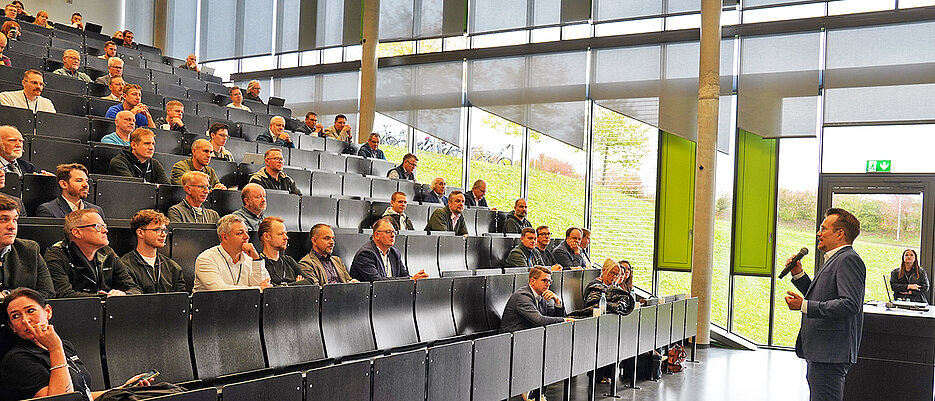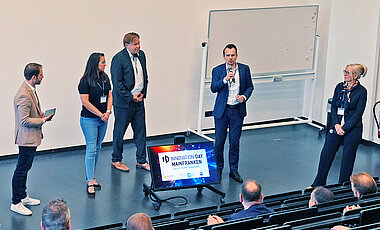A Day for Cyber Security
10/28/2025Hacker attacks can paralyse companies, administrations and universities. The Innovation Day Mainfranken 2025 on 22 October showed what this can look like and how to protect yourself effectively.

A single data leak can cost millions of euros - or paralyse entire systems. The Innovation Day Mainfranken 2025 impressively demonstrated just how serious the threat of cybercrime is. Under the motto "Digital.Sicher.Geschützt", this year's event focussed on the topic of cyber security - and the question of how hacker attacks on companies, administrations and universities can be prevented.
The Innovation Day was organised by the Julius-Maximilians-Universität Würzburg (JMU), the Technische Hochschule Würzburg-Schweinfurt (THWS), the IHK Würzburg-Schweinfurt and Region Mainfranken GmbH. Representatives from the worlds of science, business and administration discussed the topic at the THWS campus on Sanderheinrichsleitenweg.
Cyber Attacks as a Real Threat to the Main-Franconian SME Sector
Caroline Trips, President of the IHK Würzburg-Schweinfurt, emphasised: "Small and medium-sized companies are particularly at risk. Events such as Innovation Day help to network knowledge and pool regional expertise."
THWS President Professor Jean Meyer referred to the THWS Technology Transfer Centres (TTZ), in particular the TTZ-WUE in Ochsenfurt, which supports companies in IT security issues. Together with the University of Würzburg, the Mainfranken location is very well positioned in this field - not only in research, but also in transfer, as Professor Matthias Bode, JMU Vice President for Innovation and Knowledge Transfer, emphasised.
The live demo by Aleksander Paravac from JMU's computer centre showed how easy it is to penetrate other people's systems and what damage can be done unnoticed. Up-to-date hardware and software makes it more difficult for attackers, but investment in the operators is also of central importance.
The Human Factor - the Biggest Gateway
The Innovation Day used a real-life example to illustrate how a €13 million MRI can turn into a pile of scrap metal: Ingo Jung from the University Hospital Frankfurt am Main explained how the hacker attack on the hospital took place and what measures the Management Board and IT chose to minimise the damage. These included the gradual opening of the point-to-point encryption of the large medical devices, the temperature monitoring of which now runs via the cloud.
The contribution from the Madinger company impressively demonstrated that not only technology but also people can become a weak point. A virus got into the system of the medium-sized industrial company from the district of Schweinfurt after employees opened an email attachment.
Professor Kristin Weber, Vice President for Digitalisation at THWS, and key note speaker Susann Bartels from The Strongest Link made it clear that the system must be viewed holistically and that resources must be made available for this.
Bettina Gardenne, Managing Director of Region Mainfranken GmbH, concluded by emphasising the importance of regional exchange: "Cyber security is not a technical niche issue, but a shared responsibility. It is crucial to learn from each other - across all sectors."
Innovation Day Mainfranken 2025 focussed on cyber security and showed that no one is safe from a hacker attack. Digital security is therefore not a luxury, but a necessity for survival. Only through knowledge transfer, cooperation and awareness can we prevent high-tech innovations such as an MRI scanner from becoming - in the worst-case scenario - a pile of scrap metal.








